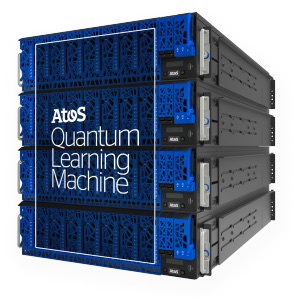 Today Atos announced the world’s first commercially available machine-system capable of simulating up to 40 quantum bits (Qubits). The simulator, named Atos Quantum Learning Machine (Atos QLM), is powered by an ultra-compact supercomputer and a universal programming language.
Today Atos announced the world’s first commercially available machine-system capable of simulating up to 40 quantum bits (Qubits). The simulator, named Atos Quantum Learning Machine (Atos QLM), is powered by an ultra-compact supercomputer and a universal programming language.
Today, by unveiling the highest-performing commercial quantum simulator in the world, Atos reaffirms both its ambition to be the industry leader in Europe and its role to accompany its clients from the outset in what is likely to be the next major technological evolution,” said Thierry Breton, Atos Chairman and CEO. “Quantum physics will lead to profound changes notably in cybersecurity, one of the key strategic priorities of businesses. We must be planning for the impact of these today. The teams at our Atos Quantum laboratory have made remarkable progress, recognized and supported by an internationally renowned Scientific Council, to provide, today, scientists and engineers from around the world with a simulation environment which enables them to develop quantum algorithms to prepare for the major accelerations to come.”
Available in 5 power configurations (30 to 40 Qubits) to cover the needs of different organizations, Atos QLM enables researchers, students and engineers to develop and test today the quantum applications and algorithms of tomorrow. The machine, designed by the ‘Atos Quantum’ laboratory – the first major quantum industry program in Europe, launched in November 2016 – has developed several top-class innovations which have resulted in numerous patent applications.
Overcoming the physical boundaries of current computing
Whereas Moore’s Law[1], which governs the microprocessor industry and has structured computing for over 50 years, will soon become obsolete, the quantum computer – based on the principles of quantum mechanics – is expected to overcome the physical boundaries of present-day computing, thus opening up new opportunities, particularly in intensive computing.
Amongst the calculating capabilities offered by quantum computing is quasi-instantaneous factorization in prime numbers (Shor’s algorithm) which would make most of the current asymmetric encryption algorithms, such as RSA – the basis of all current internet security and banking systems – vulnerable.
It is for this reason that Atos is already working to implement ‘quantum safe’ security algorithms, the level of complexity of which would allow data to be protected from any unlawful decryption, including by a quantum computer. Atos QLM will also be used to work towards new quantum algorithms, and will be available for the entire scientific and developer communities.
A universal programming language: aQasm (Atos Quantum Assembly Language)
The teams working in the Atos Quantum laboratory have developed a universal language:
- 100% quantum: aQasm can be executed as of today on a quantum simulator but also on quantum accelerators or physical quantum computers as soon as they are developed
- Configurable: aQasm offers the ability to program quantum gates (by analogy to the Boolean gates of classical computing) and to mix them with other existing quantum gates in order to deliver more complete extensions
- Standardized: aQasm is the common language of all future developments from the Atos Group on quantum, ensuring interoperability over time and a smooth transition to quantum
Thanks to this universal configuration, aQasm enables connectors, which carry programs from other quantum simulators, to be developed.
In this video, Artur Ekert, Professor of Quantum Physics at the Mathematical Institute, University of Oxford describes how the digital world will undergo a technological revolution radically changing all sectors of activity.
A new ultra-compact supercomputer, the same size as an enterprise server
Atos Quantum teams have designed a new ultra-compact supercomputer to run this universal quantum language, offering the following benefits:
- The ability to process Qubits in memory and thus speed up processing;
- A unique firmware (micro-software integrated in the hardware) optimizing the data exchanges as defined in the quantum model developed in aQasm;
- Specific hardware components to accelerate specific quantum calculations and which can eventually be replaced by quantum accelerators.
- Easy to deploy. The system is the same size as a standard business server and can easily be installed on-site at all types of office environments.
Outstanding results praised by a world-class Scientific Council
As work progresses, Atos Quantum continues to work with a world-renowned Scientific Council, the last meeting of which was on 31st May, and which approved the scientific value of Atos’ work.
There is real excitement about new technologies like Quantum Computing, however many things are needed to help users learn how to program and use Quantum computers,” said Earl Joseph, CEO at Hyperion Research. “By providing universities, research institutes and both large and small businesses across the world access to its QLM, Atos is enabling organizations to experiment with Quantum computing and prepare for this potential revolution in computing.”
In the coming years, quantum computing should be able to tackle the explosion of data brought about by Big Data and the Internet of Things. Thanks to its innovative targeted computing acceleration capabilities based in particular on the exascale class supercomputer Bull Sequana, quantum computing should also foster developments in deep learning, algorithms and artificial intelligence for domains as varied as pharmaceutical or new materials. To move forward on these issues, Atos plans to set up several partnerships with research centers and universities around the world.



